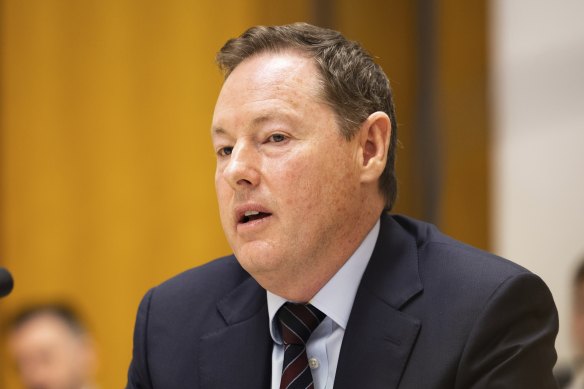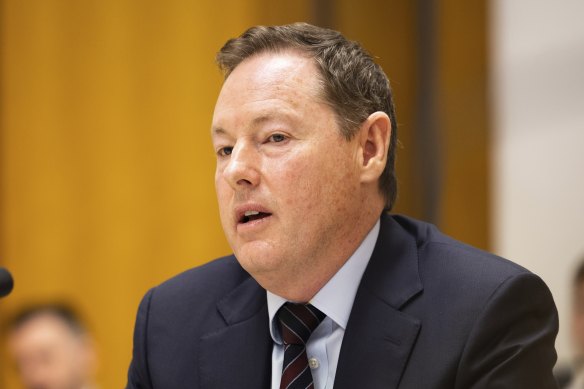In a country obsessed with punting, why are some of the biggest wagering businesses struggling?
The giants of the global industry and our own stalwart Tabcorp have warned investors to brace for lower returns and a softer market this financial year.

The weak betting market in Australia is driving lower earnings for gambling companies.
Sadly for punters, it’s not because the bookies have suddenly started losing. Between looming federal changes, increased state taxes and the inflated cost of living, there’s a lot of uncertainty ahead for the once recession-proof industry.
State of play
The jewel of $48 billion Irish giant Flutter used to be its Australian outfit Sportsbet, but recent revenue decline has meant its US and UK operations are now doing the heavy lifting.
Last month, Flutter revealed Sportsbet’s revenue had fallen 18 per cent over the quarter to $502 million. Overall, Sportsbet’s revenue has fallen 7 per cent year on year, with the business predicting mid-single digit decline for the 2024 financial year due to increased regulation, a weaker market and the recent ban on credit card deposits.

Credit: iStock
“The combination of these items will now limit our ability in the near-term to offset the impact of the previously announced Victoria point-of-consumption tax increase from July 2024,” Flutter said last month.
Flutter said the weak betting market in Australia had driven it to lower its earnings forecast for the financial year, with the business now expecting about $2.76 billion in earnings before interest, tax, depreciation and amortisation, which is the bottom of its original forecast.
Flutter’s new darling is the US business FanDuel, which raked in about $150 million more than any other section over the quarter. But even the booming US market is not enough to push up the business entirely, with its London-listed share price falling by 20 per cent over the past six months to $24,164.
It’s not just Australia’s biggest corporate bookmaker that is suffering. ASX-listed Tabcorp and LSE-listed Entain have also flagged that they are experiencing weakened trading conditions in Australia. Tabcorp’s revenue has fallen by more than 6 per cent for the first quarter of 2024 and Entain said in September that its local revenue had slumped by high single digits.
Tabcorp’s share price has fallen by 35 per cent over the past six months to 74¢ and the price of Entain’s shares have slumped by 39 per cent to $1,644.

Tabcorp chief executive Adam Rytenskild.Credit: Alex Ellinghausen
Tabcorp recorded a $66 million profit in 2023 and chief Adam Rytenskild was quick to point out in August that it was the only local wagerer to increase its earnings over the year.
Tabcorp has benefited from recent point-of-consumption tax hikes in Queensland, Tasmania and the ACT which have meant its corporate competitors now pay more tax in those states despite being licensed in the Northern Territory. Victoria will up its point-of-consumption tax to 15 per cent from July to match NSW, Western Australia, South Australia and Tasmania. The rate is 20 per cent in Queensland and the ACT.
The role of COVID-19 lockdowns
Part of the share price decline across the industry is down to normalisation after the end of COVID-19 lockdowns. Most wagering executives have been reticent to admit the pandemic was great for turnover, but customer engagement soared over 2020. This is also reflected by the share price curves of most of the major wagering businesses, including London-listed Flutter and Entain as well as locally listed Tabcorp and PointsBet, which all soared after the initial shock of the lockdown in March 2020.
According to data released by the Australian Institute for Family Studies, the proportion of people who gambled four or more times a week increased from 23 per cent to 32 per cent over the 2020 lockdowns despite restricted access to physical venues and a decrease in the number of sports games being played. The data also revealed that almost one in three people surveyed signed up for a new online betting account and one in 20 began gambling online for the first time.
Flutter said at the end of last year that Sportsbet’s 14 per cent decline in revenue on the year prior was due to “lower levels of player engagement compared to the prior year, when more than 60 per cent of the country was in lockdown,” and added that weather-related racing disruption had also dampened turnover.
Regulatory uncertainty persists
The major obstacle the local market faces is sustained uncertainty around looming federal changes. The House of Representatives standing committee on social policy and legal affairs issued the government 31 recommendations following a lengthy inquiry into online gambling harm this year.
Banning gambling advertisements within three years has been the most publicised recommendation in the report due to the financial ramifications for not only the wagerers but major sporting codes and media companies. But most wagering executives are far more worried about a potential ban on inducements including bonus bets and deposit matches, which are key ways to entice punters to seek out their products.
The government was expected to respond to the recommendations earlier this month but has not yet done so. Communications Minister Michelle Rowland told the National Press Club last week that it was important to get the policy settings right. She also hinted she would not pursue an outright ban on gambling advertising but would be “guided by the principles of harm minimisation”.
The government has already banned the use of credit cards for online wagering and launched its long awaited self-exclusion register, Betstop. About 13,000 people have used the service in its first three months of operation, with 40 per cent banning themselves for life.
This masthead revealed in October that government officials had been consulting industry stakeholders about limiting the frequency of advertisements on TV and radio rather than banning them.
The biggest cause of gambling harm in Australia is poker machines – most problem gamblers in treatment have machine-related addictions. But many gambling-harm experts say gambling advertisements can encourage young people and those with existing gambling problems to seek out betting when they would otherwise abstain.
The Business Briefing newsletter delivers major stories, exclusive coverage and expert opinion. Sign up to get it every weekday morning.
